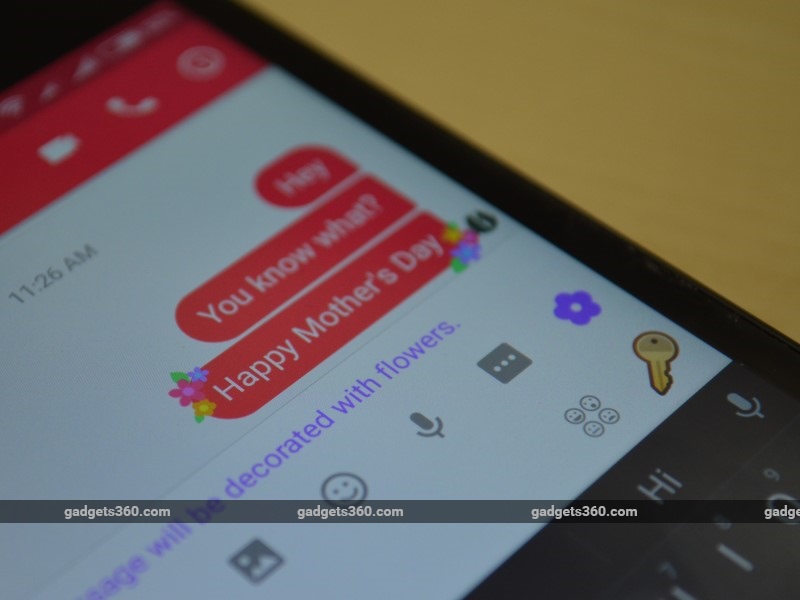- Home
- Social networking
- Social networking Features
- Mother's Day: For Some, Facebook's Automatic Reminders Bring Grief
Mother's Day: For Some, Facebook's Automatic Reminders Bring Grief

"Don't worry Facebook, I know Mother's Day is coming. Painfully aware. Thanks for the wake up reminder," she wrote on Facebook later that morning.
These days, Facebook news feeds display company-generated "On this Day" suggestions, birthday notifications and holiday reminders, like the Mother's Day banner (Facebook refers to these banners as "greetings"), in part because the network wants to encourage its users to post more about their personal lives. But not every moment or memory is a good one, and Facebook has increasingly been asked to do more to prevent its messages and nostalgia experiments from cheerfully reminding its users of moments they'd rather forget.
Although there's no way to "opt out" of the Mother's Day or Father's Day messages in advance, Facebook did take steps to prevent its Mother's Day message from appearing to those who would prefer not to see it. The site lets immediate family members "memorialize" the profile of someone who has died - a setting that gives the family some control over that profile and changes how Facebook treats it. Anyone who lists a memorialized profile as a "mother" or "child" on Facebook won't see this year's Mother's Day messages.
That's a good consideration, but it has a prerequisite, one that not all of its users can or will meet. To benefit from it, you have to keep Facebook up-to-date with information about your family. Scalzo's mother was on Facebook, but Facebook doesn't know their relationship. And her mother's profile wasn't memorialized.
Everybody, at some point, will encounter an online ghost of someone they've lost. Sites that catalog the social media profiles of the dead have been around since before Facebook: MyDeathSpace, the best-known of these, takes its name from MySpace, the social network that Facebook buried years ago. There are message board posts, emails in contact lists and long-uploaded photographs on the Internet that could, without warning, bring back an unwanted memory.
Facebook's "greetings" and nostalgia projects amplify these ghosts for a couple of reasons. First, Facebook feels so personal. Checking your news feed feels like a personal act, and your profile feels like a personal space for some measure of self-expression. Sure, on some level, we all know that the news feeds are controlled by an algorithm and that the way you use the site, including the personal touches you put on your profile, help Facebook collect data about you for advertisements.
But it's easy to forget. That is, except for when that algorithm shows you something you don't want to see, in a way that reminds you of its limitations. An "important" memory and "really great" memory might look similar to an algorithm, but they can be painfully different for the actual human who experienced it.
Meg Turecek is 49, a year older than her mother, Maggie, was when she died 25 years ago from cancer. Wednesday was Turecek's last day of six weeks' radiation, four weeks of chemo, to treat her own illness, Stage 4 glioblastoma brain cancer, she said in a message to The Washington Post. When she signed onto Facebook that morning, she too was greeted with a reminder of Mother's Day.
"Why can I not disable your 'mother's day reminder'?" Turecek wrote in a public post addressed to Facebook, "This is NOT A NICE REMINDER of my mother's death. Thank you for making me sad all over again!"
The small reminder message Turecek saw cannot be hidden from a news feed, but it does disappear once you scroll past it. (The company said it plans to make its larger Mother's Day message this Sunday dismissible with a drop-down menu.)
"I understand Facebook's intention was likely not to cause pain," Turecek told The Post, "but to celebrate all the wonderful mothers who take care of their precious families every day. But they need to be mindful of possible other receptions to their actions."
That is something that, for Facebook, has been a learning process.
In 2014, Facebook's "Year in Review" feature showed users a slideshow of their most important moments (at least, according to an algorithm), with the tagline, "It's been a great year! Thanks for being a part of it." But that wasn't true for everyone. Eric Meyer checked into Facebook and saw a message urging him to create his own year in review slideshow. In the center of the cheerful banner was a photo of his dead daughter. Facebook promised to do better.
Since then, the site has introduced a handful of tools designed to allow users to opt out of seeing nostalgia prompts that might trigger particularly bad memories. "On this Day" lets users filter out specific people or dates. It introduced a series of breakup tools. And there are the behind-the-scenes filters Facebook is starting to use for messages like its Mother's Day reminders.
Facebook wants to master the art of nostalgia. With the amount of information they've collected on their users' lives over the past years, it's easy to understand why. The Mother's Day reminders show just how complicated it will be for Facebook to minimize the tragedy those excavations inadvertently dig up.
© 2016 The Washington Post
Get your daily dose of tech news, reviews, and insights, in under 80 characters on Gadgets 360 Turbo. Connect with fellow tech lovers on our Forum. Follow us on X, Facebook, WhatsApp, Threads and Google News for instant updates. Catch all the action on our YouTube channel.
Related Stories
- Samsung Galaxy Unpacked 2025
- ChatGPT
- Redmi Note 14 Pro+
- iPhone 16
- Apple Vision Pro
- Oneplus 12
- OnePlus Nord CE 3 Lite 5G
- iPhone 13
- Xiaomi 14 Pro
- Oppo Find N3
- Tecno Spark Go (2023)
- Realme V30
- Best Phones Under 25000
- Samsung Galaxy S24 Series
- Cryptocurrency
- iQoo 12
- Samsung Galaxy S24 Ultra
- Giottus
- Samsung Galaxy Z Flip 5
- Apple 'Scary Fast'
- Housefull 5
- GoPro Hero 12 Black Review
- Invincible Season 2
- JioGlass
- HD Ready TV
- Laptop Under 50000
- Smartwatch Under 10000
- Latest Mobile Phones
- Compare Phones
- OPPO A6v 5G
- OPPO A6i+ 5G
- Realme 16 5G
- Redmi Turbo 5
- Redmi Turbo 5 Max
- Moto G77
- Moto G67
- Realme P4 Power 5G
- HP HyperX Omen 15
- Acer Chromebook 311 (2026)
- Lenovo Idea Tab Plus
- Realme Pad 3
- HMD Watch P1
- HMD Watch X1
- Haier H5E Series
- Acerpure Nitro Z Series 100-inch QLED TV
- Asus ROG Ally
- Nintendo Switch Lite
- Haier 1.6 Ton 5 Star Inverter Split AC (HSU19G-MZAID5BN-INV)
- Haier 1.6 Ton 5 Star Inverter Split AC (HSU19G-MZAIM5BN-INV)

















